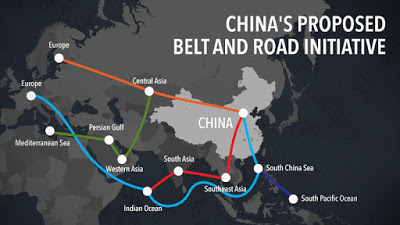Nelson Mandela made the political decision for South Africa to establish
diplomatic relations with the People’s Republic of China.
realised a triple jump from a partnership to a strategic partnership, and now
to comprehensive strategic partnership. In the process, a tremendous amount of
tangible benefits have been delivered to both peoples.
gained growing strategic and global significance.
beneficial partner to South Africa. Over the years, a multi-layered,
wide-ranging and all-dimensional co-operation framework between China and South
Africa has taken shape. China-SA relations have become a role model for China’s
co-operation with other African and developing countries.
 |
| (Photo: Young Diplomats) |
The fruitful, productive co-operation was under the framework of three major
platforms, namely the Forum on China-Africa Co-operation (Focac), Brics, and
the Belt and Road Initiative (BRI), of which South Africa has established
itself as both a major contributor and the biggest beneficiary across the
continent.
The Belt and Road Initiative, proposed by China in 2013, aims to build trade
and infrastructure networks connecting Asia with Europe and Africa along the
ancient silk Road trade routes to seek common development and prosperity.
In mutually beneficial and win-win co-operation, China has for nine years in
a row been South Africa’s largest trading partner.
In 2017 bilateral trade grew by 11.7% to $39.17billion, a more than 20-fold
increase from the figure at the beginning of diplomatic relations.
South Africa has been China’s largest trading partner in Africa for eight
consecutive years, accounting for a quarter to a third of China-Africa overall
trade.
Export of South African agricultural products such as wine, rooibos tea and
apples are trending upward fast. In September 2017, South Africa became the
first African country to export beef to China.
China has become a major investment partner to South Africa for stimulating
economic and social transformation and development. South Africa is the top
destination of Chinese investment in Africa.
Combined existing and planned direct investment from China to South Africa
reached over $25bn in accumulative terms by June 2017 in manufacturing,
processing, mining, finance, energy, tourism, commerce, trade, and services.
Incomplete statistics show more than 180 major Chinese enterprises and
thousands of Chinese small and medium enterprises have established business in
South Africa, creating thousands of jobs for South Africans.
Thousands of Chinese investors, big or small, made their due contributions,
be it millions of US dollars of taxes or billions of US dollars of foreign
reserve earnings. There are plenty of examples.
Apart from the many manufacturing plants Chinese have in South Africa, this
year will also see the launch of the production line of the Beijing Automobile
International Corporation (BAIC) in South Africa, with a total investment of
nearly $800million. The Chinese investors are about to invest in a cluster of
all vehicle production lines in South Africa in the near future.
In 2013, a Chinese company purchased the Palabora Mining Company (PMC) in
Limpopo, extending the mining operation for another 20 years and as a result,
helped keep 5000 jobs for locals.
China Longyuan Power Group Corporation, the world’s largest wind-power
developer, made $5bn of investment for a wind power installment in the Northern
Cape.
It will produce more than 644-million kWh of green energy a year, which will
help meet 85000 households’ power demand and reduce 620000 tons of carbon
dioxide.
Ji Dong Development Group invested $220m in the Mamba cement project in
South Africa, creating over 200 local jobs and boasting near zero air and water
pollution.
Five Chinese financial institutions including the Industrial and Commercial
Bank of China (ICBC), Construction Bank of China, Bank of China (BOC), China
Development Bank and the China-Africa Development Fund have a combined
investment of over $6.6bn in South Africa, and provide loans of over $10bn to
local companies, creating over 10000 jobs and contributing tax payment of
$100m.
In 2008, the ICBC acquired a 20% stake of the Standard Bank worth of $5.46bn
and became its single largest shareholder, which enabled strategic co-operation
of the banks.
China is the strongest partner for building South Africa into the tourism
hub of the world. In 2016, there were 135million Chinese outbound travellers
and tourism expenditure was $261bn – twice as much as that of the US. It is
estimated that tourism expenditure from China will reach $429bn by 2021.
It is estimated that over the next five years, China will import over
$8trillion of goods, and the outflow of foreign direct investment will exceed
$750bn. While South Africa is actively pursuing economic and social
transformation, China is promoting the supply-side structural reforms.
Through mutually beneficial and win-win co-operation, China could contribute
significantly to South Africa’s agenda for renewal, jobs creation and
transformation as emphasised by President Cyril Ramaphosa in his maiden State
of the Nation address.
The Chinese government is committed to encouraging more Chinese companies,
investors and tourists to join South Africa’s endeavour for sustainable
development and prosperity. China supports South Africa to play a leading and
pioneering role in Africa, and become a locomotive to lead Africa’s
industrialisation.




